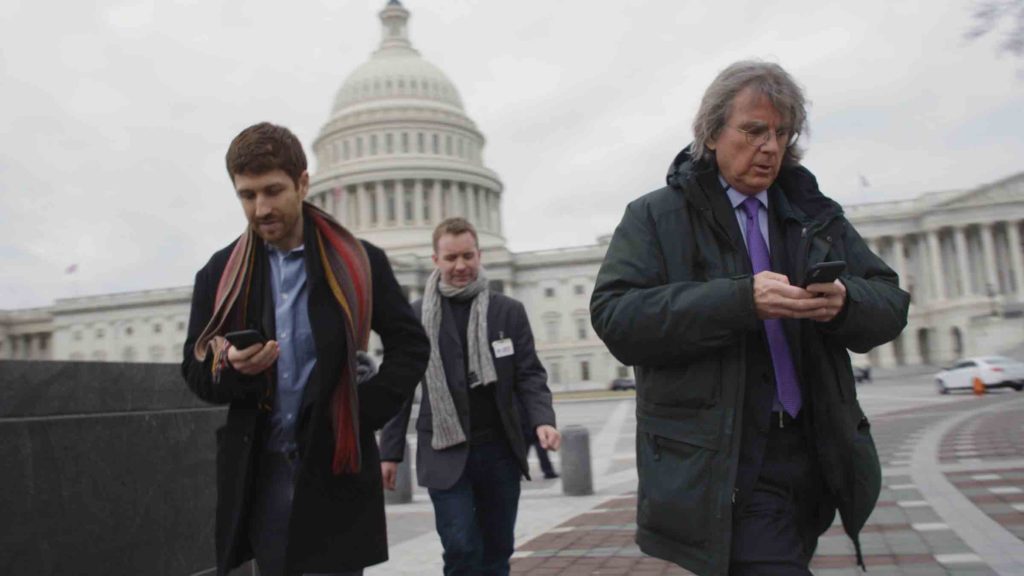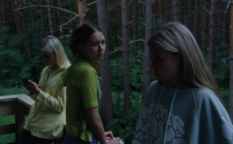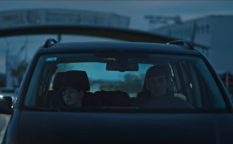Review: The Social Dilemma (2020)

An institution, conservative by default, like the Academy of Motion Picture Arts and Sciences, is still reluctant to hand out its Oscar statues to the films distributed predominantly on streaming platforms, but the year of the pandemic might turn the tables in that department, too. Simply, outside the world of Netflix and Amazon, there is not much going on at the moment. Also, due to its inherent conservativism, The Academy is more keen on “experimenting” in the “less popular” categories like Best Documentary, where a certain percentage of the nominees and winners from the last several years came from the Netflix kitchen. So, it is safe to assume that the majority of the next year’s nominees would come from the same place, and The Social Dilemma positions itself from early on as one of the likely candidates.
There are numerous reasons for that and only a few of them have anything to do with the merit of quality. Firstly, it is a very American film – semi informative, partly sensationalist, chewing a “Big Issue” into the average audience-friendly small chunks. Secondly, its Sundance premiere and a short festival tour (Impact Award at Boulder, Honourable Mention at CPH:DOX), are a sign of its audience pleasing nature. Thirdly, its international Netflix release, obviously tampered with and updated from the original festival-going version, created a considerable amount of buzz. Finally, the issue of the various social media creating different narratives and shaping various “truths” is always a hot topic, especially in the year of the US presidential elections.
Fact is, Jeff Orlowski – previously known for his environmental documentaries Chasing Ice (2012) and Chasing Coral (2017), does not bring much of new stuff to the debate about the ethics of the social media, their addictiveness, their shaping of the “truth” and creating divisions amongst people, or about their data-storing, manipulation and selling, as well as the consequences of the social media world for the ordinary daily life of people. One could say that Orlowski walks the path already laid out by Werner Herzog and his Lo and Behold: The Reveries of the Connected World (2016) and various other filmmakers and their documentaries about the IT industries and the internet, but also by fiction films like Henry-Alex Rubin’s Disconnect (2012) that he quotes. Also, his documentary fiction segment was obviously inspired by Jason Reitman’s Men, Women and Children (2014) and it serves as the sensationalist illustration of how the social media shape the life of an ordinary family.
Other than that, we have the opportunity to see the interviews with (former) CEOs of the internet and social media companies, coming from the ranks of Google, Facebook, Instagram, Twitter and others, in which the creators themselves frankly speak about the dangers and the challenges of those companies, their products and features. The implications go from addictiveness and changes in behavioural pattern to the polarization of society, the spreading of fake news and conspiracy theories to the rise of populism. We also have some brief passages of the archival material, some quotes from the computing science pioneers and some handsome graphics, with the ominous music always playing in the background, clearly steering the viewer in the direction Orlowsky wants.
When we talk about the ethics and the humaneness (or the lack of them both) of the social media, two key arguments are the notion that “if you are not paying for the product, then you are the product” and that all the social media offers to is algorithm-based. Both of those arguments could also be used against the film’s distributor. Paying for Netflix does not make you less of a “product” (aka “the viewer”) to be sold to other companies they are partnered with. Regarding the algorithm, the non-human algorithm is the one who picks the suggestions for your amusement based on your previous inputs. Just a thing to think about while Jeff Orlowski and his interviewees want you to be scared of the Matrix-like dystopia they compare the world of social media with in The Social Dilemma, distributed by a streaming giant.
Runtime: 94’
Country: USA
Language: English
Directed by: Jeff Orlowski
Written by: Jeff Orlowski, Vickie Curtis, Davis Coombe
Cinematography by: John Behrens, Jonathan Pope
Editing by: Davis Coombe
Music by: Mark A. Crawford
Production design by: Adam Wheatley
Costume design by: Suzie Ford, Melissa Karsh
Assistant director: Travis LaSalle
Produced by: Larissa Rhodes
Production companies: Exposure Labs, Argent Pictures, The Space Program
Distribution by: Netflix
















